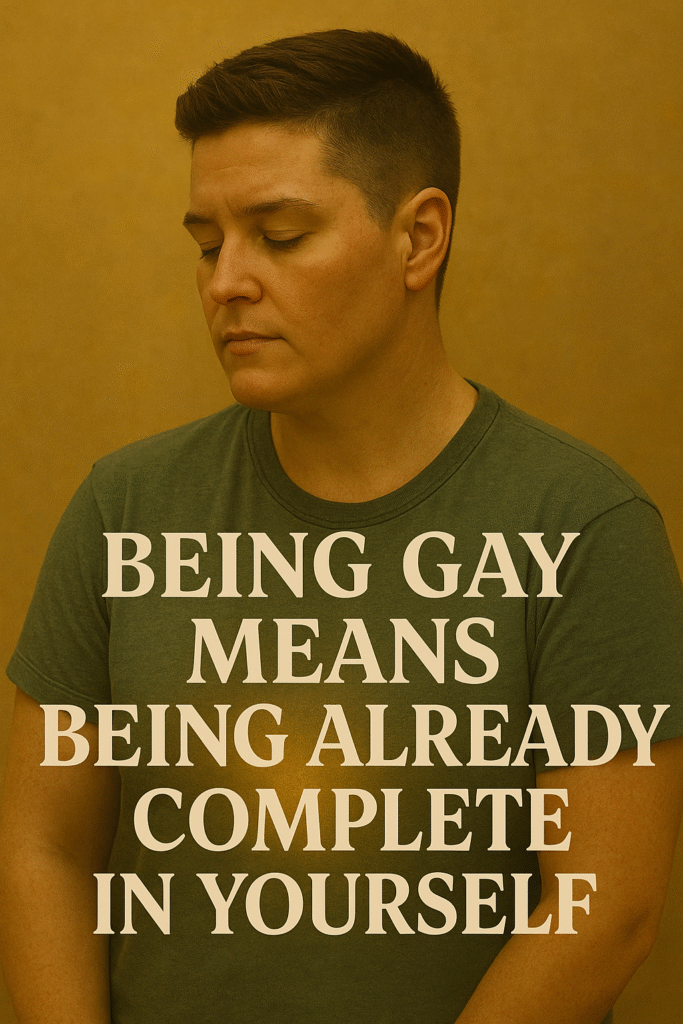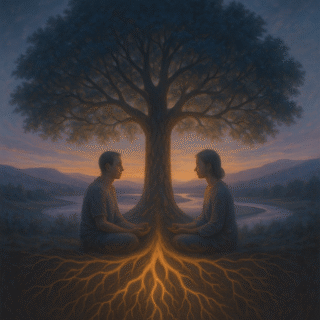ALREADY WHOLE: THE INNER TRUTH OF BEING GAY
In Soulfully Gay II, I explore a spiritual truth that may sound paradoxical in a world that still teaches queer people to doubt themselves: being gay means being already complete in yourself.
This isn’t a feel-good slogan. It’s a radical spiritual insight with roots in centuries of philosophy and mystical wisdom. It’s based on the principle of self-immanence—the idea that what you most deeply seek is not outside you, but already present as you. Love, belonging, truth, even the sacred itself—they are not something you need to acquire or earn. They are what you are.
Your body knows this. Your desire knows this. The problem is: the culture doesn’t.

A First Touch
Imagine a young man, twenty-two, who has spent years repressing his desires. He’s been taught to believe that his love for other men is a defect, a detour, a temptation. He’s lived behind a mask—smiling, achieving, fitting in. But inside, he’s starving.
Then one night, he kisses another man. The kiss is electric. His whole body lights up. When he reaches out and touches this other man’s chest, it’s as if he’s touching his own body for the first time. He feels warmth, strength, vulnerability—and in the same moment, he feels real. Not because the other man is completing him, but because the veil is lifting.
He is remembering who he already was.
This moment isn’t just romantic. It’s spiritual. He is touching not only another man’s body, but his own sacred aliveness. For the first time, the shame cracks open and light shines through.
That’s what self-immanence looks like: discovering the divine not beyond, but within the truth of your own desire.
What the Philosophers Have Been Saying
This isn’t just poetry. Philosophers have been whispering this truth in different ways for centuries.
Spinoza: God Is Everything That Is
Baruch Spinoza taught that God is not above or outside the world. God is the world—every body, every mind, every moment of becoming. The divine doesn’t break into creation from on high. It shines from within all things.
If that’s true, then your longing for another man, your delight in his presence, the way your body awakens in love—these are not obstacles to God. They are the presence of God.
To love someone like yourself, in truth and beauty, is to participate in the divine flow of Nature itself.
Hegel: Spirit Becomes Itself in History
Georg Wilhelm Friedrich Hegel believed that reality unfolds as Spirit becoming conscious of itself—through individuals, through culture, through history. Selfhood is not a given; it is realized over time.
What does that mean for us?
It means that the gay man’s journey—from repression to self-acceptance, from fear to love—is not just personal. It’s cosmic. Each moment of awakening is Spirit saying, “Yes. I am this too.”
When you see your love as part of something larger—not in opposition to God, but as God remembering God—everything changes. Your story becomes sacred history.
Nietzsche: This Life, This Body, This Moment
Friedrich Nietzsche fiercely rejected morality that devalues the body, the earth, or the now. He saw traditional religion as denying life in favor of an abstract beyond. He called for a revaluation of values—a return to what is vital, embodied, and real.
Being gay, in this light, is not a problem to be solved—it’s a reclamation of life. When a gay man embraces his desires, loves without apology, and says yes to his own joy, he is not sinning. He is affirming the sacred in the flesh.
Your body doesn’t need to be purified. It needs to be listened to. Honored. Celebrated. As it is.
Nondual Wisdom: You Are Already That
In Advaita Vedānta and other nondual traditions, the highest realization is not reaching God, but knowing that you are not separate from the divine. The mantra Tat Tvam Asi means “That Thou Art”—you are already what you seek.
This is perhaps the deepest resonance with the soulfully gay path: to recognize that in your same-directed love, your vulnerability, your beauty, your eros—you are not missing anything. You are already whole.

If I’m Already Complete, Why Do I Long So Deeply for Another?
This is one of the most tender and paradoxical questions a soulfully gay man may ask:
“If I’m already whole, already divine within myself… then why do I ache so much for another man? Why do I burn with longing?”
The answer begins by rethinking what desire is.
Desire isn’t proof of lack. It isn’t a signal that something essential is missing in you. Desire is how wholeness moves, how it calls to itself, how it recognizes itself in another. The longing is not for completion, but for communion—for the joy of mirroring, touching, holding what you already are… in another form.
Imagine a song that is so beautiful it longs to be heard again. Imagine a flame that burns not because it’s dying, but because it’s alive. That’s what desire is.
Yes, it can feel painful. The heart expands to make room for love, and sometimes that stretching hurts. The body awakens to another and feels exposed. But that pain is the stretching of self-recognition—the ache of love remembering itself.
So when you long for another man’s gaze, his touch, his presence, don’t think of it as a gap in your being. Think of it as your wholeness seeking reflection, resonance, and joy in relationship.
You are not empty without him. You are already full. But in your fullness, you are capable of an even greater joy: the overflow that comes when two whole selves meet and create something more.
Stop Reaching. Start Remembering.
You don’t need to be fixed. You don’t need to climb a ladder to God. You don’t need to change your love into something more acceptable.
You only need to remember what has always been true: You are already complete in yourself.
The world may never have told you this. But your heart knows. Your breath knows. Your body knows.
So let yourself know.





